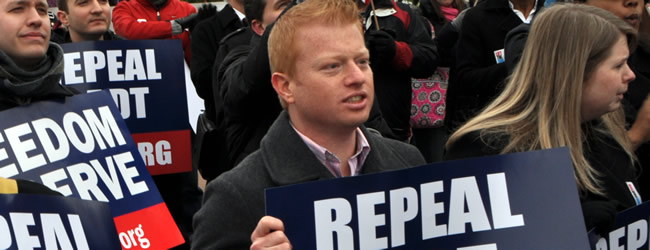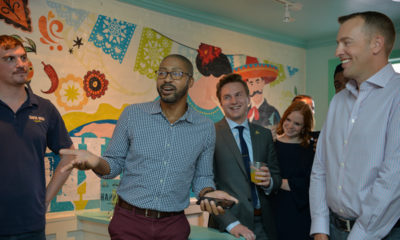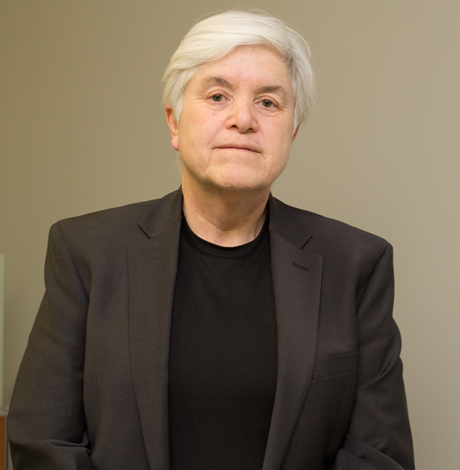Living
Gay Hill staffer remembered for humor, dedication
Crowe, 29, succumbed to staph infection

The booming voice of Katy Perry accompanying a techno-dance beat of her song “Firework” jolted Kyle Murphy from sleep a couple months ago at 3 a.m.
Curious about the disturbance, Murphy arose from bed to find his best friend and roommate Christopher Crowe dancing on top of their kitchen island.
“I didn’t know what was going on,” Murphy said. “He had brought some friends home and the first thing I saw was him standing on the island in our kitchen dancing to Katy Perry. He was kind of the life of the party.”
For Murphy, who had known Crowe for more than five years since they interned together at the Gay & Lesbian Victory Fund, the memory represents Crowe’s over-the-top personality and willingness to go to great lengths to entertain others.
“Somebody had collected some quotes he used to say in his office, and one of them was ‘I say ‘no’ to drugs, and that’s it,'” Murphy said. “And that kind of, I felt like, summed up his personality.”
Crowe died last week at the Washington Hospital Center from a staph infection that damaged his heart after he contracted meningitis last summer.
Crowe, 29, who was gay, served as president of the LGBT Congressional Staff Association and as a staffer for Rep. Eddie Bernice Johnson (D-Texas). The death of the Kentucky native struck many Capitol Hill staffers and LGBT advocates with grief and prompted fond recollections of his life this week.
Johnson issued a statement expressing sorrow over the loss of her longtime staffer and sympathy for his family and loved ones.
“He was respected by his colleagues for his professionalism; he was beloved by many for his generous spirit and good humor,” Johnson said. “He was a person who enjoyed life and always had a smile to share. He never met a stranger.”
Many friends who worked with him on Capitol Hill and in LGBT advocacy had similar recollections of Crowe’s outgoing personality, which they said enabled him to make fast friends.
Marcus Paulsen, who’s gay and an administrative coordinator for the nonprofit group Community Wealth Ventures, said Crowe had a unique way of making others feel at ease.
“He was always laughing, and it didn’t matter if you told the dumbest joke,” Paulsen said. “He always would find it funny and could find something hysterical about it.”
A Dallas native, Paulsen said Crowe helped him obtain a position as an intern, and later a staffer, in Johnson’s office, where the two worked together for a year-and-a-half.
Paulsen recalled a time in December 2009 when he and Crowe participated in a retreat for staffers in Johnson’s office in Texas. Identifying the experience as one of his fondest memories of Crowe, Paulsen said people he knew from his home state easily made friends with Crowe.
“For me, it was kind of two worlds coming together: my D.C. life and my Texas life,” Paulsen said. “I wasn’t really sure how people would react to some of my D.C. friends and Chris, but he just had this way of becoming really close with people and everybody just absolutely adored him.”
Jason Mida, the Victory Fund’s vice president of development, knew Crowe from his days as an intern at the organization in 2005 and said Crowe had a unique way of drawing others to him.
“It didn’t matter who you were, it didn’t matter what your political affiliation was,” said Mida, who’s gay. “People were drawn to Chris. He was a ball of life and people wanted to be around him because you just felt better. You felt better about yourself; you felt better about things in general when he was around.”
Scott Simpson, press secretary of the Leadership Conference on Civil and Human Rights, knew Crowe from working together on the LGBT Congressional Staff Association and said he admired the confidence that gave Crowe the ability to speak with anyone.
“He had an ease about dealing with any range of people,” Simpson said. “Chris wouldn’t think twice about calling up the highest-level person in an agency or to the lowest-level person.”
Simpson said Crowe’s care for others enabled him to stay engaged with friends even as he struggled with meningitis for several months.
“This was a man who was in the emergency room,” Simpson said. “He was sending e-mails, text messages, asking how things are going, asking if he can help. If you didn’t know that Chris was sick, if you weren’t informed about it, people never knew.”
While always eager to have a good time with others, Crowe was also known among his friends as a passionate worker in both legislative affairs and LGBT advocacy.
Murphy, a communications specialist for the National Minority AIDS Council, recalled that Crowe’s dedication enabled him to rise quickly to become a high-level staffer for Johnson and to get elected as president of LGBT Congressional Staff Association.
“Everything that I heard about him was that he was amazing — not the greatest writer — but he had dyslexia, but he worked through that very well and didn’t let anything hold him back,” Murphy said.
Simpson recalled his days as president of the LGBT Congressional Staff Association before he left Capitol Hill when Crowe served as his deputy. The two worked on recreating the association after it had long been dormant.
Even though their work in recreating the association involved activity on rewriting bylaws and other less-than-exciting tasks, Crowe found ways to make the work enjoyable.
“Chris made people come to these meetings and actually enjoy themselves and actually laugh,” Simpson said. “He understood that in order to commit people to make change, they had to have a good time and that, I believe, was his secret weapon.”
As evidence of Crowe’s jovial personality, Simpson noted that Crowe would only refer to him as “Girl!” during the course of their work together. Simpson joked that he didn’t know if Crowe actually knew his name.
In his days as a Victory Fund intern, Mida said Crowe was dedicated and passionate about LGBT advocacy. He took a personal interest in working to elect Vivian Paige, a lesbian who ran in 2005 for city treasurer in Norfolk, Va.
“I remember how visibly upset he was when Vivian lost that night,” Mida said. “We’d only been there a few days, but he was so invested. I think that across the board —whether it was his work and whether it was relationships with folks — he immediately became invested in folks, and as a result, people were invested in him.”
Among the activities that friends cited as Crowe’s favorite was travel. In his work on foreign affairs issues for Johnson, Crowe would often take opportunities to go abroad as part of his work as a congressional staffer.
Murphy recalled that Crowe traveled to Dubai and Abu Dhabi in the United Arab Emirates as part of his work for Johnson, which Murphy said gave Crowe “a travel bug.”
Among the trips that Murphy took with Crowe was an expedition with him and his mother on a Key West cruise in 2009.
“We were both redheads and so we just kind of looked like brothers, so we just starting telling everybody that we were brothers from that cruise ship on — and I referred to his mom as ‘Mama,'” Murphy said.
Murphy recalled that he and Crowe went to Peru in 2008 and Crowe traveled with other friends to Bangkok and Hong Kong. Before Crowe’s death, Murphy said his friend had asked him to put together another trip together.
But dreams for travel and ambitions for further work on LGBT issues and politics were cut short. Murphy, who was present at the hospital where Crowe died, was the first of his friends to know.
“His mom had called me and was kind of frantic telling me the doctors had come out of the operating room saying they didn’t know if he was going to make it, so I rushed to the hospital,” Murphy said. “By the time I got there, he had passed.”
Murphy said in the operating waiting room he encountered Crowe’s mother, who was crying and at first unable to speak, but then said, “We lost him.” Murphy said the news was devastating, but he took on the responsibility of sending e-mails to Crowe’s friends and fellow Hill staffers to inform them.
Paulsen was one of the recipients of the e-mails and, in a state of shock, said he immediately left work upon hearing the news.
“I walked all the way over to Chris’ apartment to be with his roommate and family,” Paulsen said. “At first I couldn’t process it, but it was just very sad.”
Another e-mail recipient, Simpson said Crowe’s death came as a surprise because those who knew him thought he could just “smile through” his disease to become healthy.
“It didn’t seem real,” Simpson said. “I knew that Chris was sick, but it was never always clear that it would be this bad.”
Simpson observed that deaths at a young age are relatively uncommon in the younger generation of gay men — unlike what older gay men faced during the AIDS crisis of the 1980s and early ’90s.
“We’re not used to death,” Simpson said. “He was the first of my peers to pass on. If you talk to gay men who are in their 40s and 50s, they had peers pass away all the time. That was one of those moments that I started to understand that this was just a hint of what gay men who were around in the ’80s were going through.”
Still, the memory of Crowe and his sparkling personality remain an inspiration for those who knew him.
Paulsen said he would always remember Crowe’s ability to find greater potential in others.
“He found some talents in me when we worked together and he made sure to always bring those up to the congresswoman or the chief of staff,” Paulsen said. “I think that’s what I’ll take from him — to try to make sure I see these things that might not be visible to everybody else and make sure that they’re aware of some of their talents.”
Murphy, who said he’s often a wallflower in social situations or nervous around guys he likes, expressed admiration for what he said was Crowe’s ability to embrace every situation head on and would try to emulate that approach to life.
“I think that’s something we and all of his friends really appreciated and his family, too,” Murphy said. “It’s something we’ll all probably try to live up to.”
For Simpson, Crowe’s memory inspires him to be proud of who he is and helps him stay grounded.
“Chris was aware of who he was and he fucking loved it, and played it up,” Simpson said. “Chris just knew that you have to be OK with who you are, but you have to be not just OK with it, but you have to own it and love it.”
A memorial service for Crowe is set to take place on Thursday at 12 pm in Room LJ-119 in the Jefferson Building at the Library of Congress. The Congressional LGBT Equality Caucus and the LGBT Congressional Staff Association are hosting the event. House chaplain Rev. Daniel Coughlin is set to officiate over the service.
Autos
Sport haulers: Jeep Grand Cherokee, Mercedes GLE-Class
Updated cabins, adept handling, and more

Now that March Madness and the Masters are over, it’s time for, well, everything else. For my husband and me, this means water sports, as in kayaks and rowing sculls, which is why we trekked to the Potomac for the George Washington Invitational regatta last weekend.
Alas, high winds splashed cold water on the event, canceling much of it. But there was still plenty of spirited camaraderie to rival “The Boys in the Boat.”
And I was reminded of my time years ago as a rower with D.C. Strokes, ferrying teammates to races up and down the East Coast. Back then my ride was a dated, rather cramped four-door sedan.
If only we could have paddled around in a sporty SUV like the two reviewed here. Now that would have been some smooth sailing (wink-wink).
JEEP GRAND CHEROKEE
$40,000
MPG: 19 city/26 highway
0 to 60 mph: 7.5 seconds
Maximum cargo room: 37.7 cu. ft.
PROS: Updated cabin, adept handling, strong towing
CONS: So-so gas mileage, no third row, pricey trim levels
IN A NUTSHELL: Rough, tough and buff. It’s doesn’t get much more butch than a Jeep. This year’s Grand Cherokee is no exception, with rugged looks, expert off-road capability and better-than-average towing capacity of 6,200 pounds.
There are a dizzying number of trim levels—more than a dozen—starting with the barebones base-model Laredo at an affordable $40,000. The lineup tops out with the Summit Reserve 4xe PHEV, which is almost twice the price at $76,000 and one of various plug-in hybrid versions available. Those plug-in hybrids can drive up to 25 miles on all-electric power before the four-cylinder gas engine kicks in. Otherwise, you can choose from a standard V6 or V8. Gas mileage on all trim levels is basically the same as the competition.
Where the Grand Cherokee really shines is in the handling. More refined than a Wrangler but less lavish than a Land Rover, this Jeep maneuvers just as well on city streets and highways as it does on bumpier terrain.
I tested the mid-range and mid-priced Overland, which comes standard with four-wheel drive and large 20-inch wheels. It also boasts a slew of niceties, such as quilted upholstery, panoramic sunroof and high-tech digital displays. These include a 10.25-inch infotainment touchscreen and rear-seat entertainment system.
The nine-speaker Alpine stereo, designed specifically for the Grand Cherokee, is pleasing. But I really wanted to hear the boffo 19-speaker McIntosh surround-sound system that Jeep also offers. Sigh, it’s only available on the premium Summit trim level.
MERCEDES GLE-CLASS
$64,000
MPG: 20 city/25 highway
0 to 60 mph: 6.6 seconds
Maximum cargo room: 33.3 cu. ft.
PROS: Lush interior, silky-smooth suspension, speedy
CONS: Some confusing electronics, tight third row, many competitors
IN A NUTSHELL: For a more high-class hauler, there’s the Mercedes GLE-Class. This midsize SUV is similar in size to the Jeep Grand Cherokee. But instead of seating five passengers, the GLE can carry up to seven. Sure, legroom in the optional third row may be tight for taller travelers, but it’s perfect for a cocky cockswain or two.
Six trim levels, ranging from the base-model GLE 350 to two high-performance AMG models. For eco-conscious buyers, the GLE 450e plug-in hybrid arrived earlier this year and can run on battery power alone for almost 60 miles.
My test car was the top-of-the-line AMG 63 S 4Matic, a head-turner in every way. Priced at a whopping $127,000, this GLE looks best in glossy black with the Night Package, which includes tasteful jet-black exterior accents and matte-black wheels. To complete the Darth Vader effect, there’s a deep, menacing exhaust rumble that’s downright threatening.
You expect such a ride to be wicked fast, and it is: 0 to 60 mph in a blistering 3.7 seconds. Yet the carbon ceramic brakes with their devil-red calipers are equally impressive in slowing things down quickly.
Inside, each GLE comes with two large digital displays on the elegantly sculpted dashboard. My favorite feature is the “Hey Mercedes” digital assistant, which responds to voice commands such as opening or closing the sunroof, operating the infotainment system or activating the climate controls.
It’s hard to find sport seats that are more comfortable, especially with the heavenly massage function (though those massage controls could be a bit more user-friendly.) For AMG models, the seats come with red-contrasting stitching and red seatbelts—a nod to the devilish demeanor under the hood.
Considering all the SUVs available in showrooms, few make quite the splash of a GLE.

Real Estate
Boosting your rental property’s curb appeal
Affordable upgrades to attract and keep tenants happy

In the District of Columbia, the rental market tends to open up significantly during the springtime for several reasons. First, spring brings about a sense of renewal and change, prompting many individuals and families to seek new living arrangements or embark on relocations. Additionally, the warmer weather and longer daylight hours make it more conducive for people to explore housing options, attend viewings, and make decisions about moving. Furthermore, spring often coincides with the end of academic terms, leading to an influx of students and young professionals entering the rental market.
Landlords and property managers also tend to schedule lease renewals or list new vacancies during this time, capitalizing on the increased demand and ensuring a steady turnover of tenants. In the competitive world of rental properties, attracting and retaining quality tenants can be challenging. However, with some strategic upgrades, property owners can significantly enhance their units’ appeal without breaking the bank. From enhancing curb appeal to interior upgrades, here are some practical and cost-effective ideas to make your rental property stand out in the market.
Curb appeal
First impressions matter, and curb appeal plays a crucial role in attracting potential tenants. Simple enhancements like freshening up the exterior paint, adding potted plants or flowers, and ensuring a well-maintained lawn can instantly elevate the property’s appearance. Installing outdoor lighting not only adds charm but also enhances safety and security.
Interior upgrades
Upgrade the kitchen and bathroom fixtures to modern, energy-efficient options. Consider replacing outdated appliances with newer models, which not only appeal to tenants but also contribute to energy savings. Fresh paint and updated flooring can transform the look of a space without a hefty investment. Additionally, replacing worn-out carpets with hardwood or laminate flooring can make the unit more attractive and easier to maintain.
Enhance storage
Maximize storage options by installing built-in shelves, cabinets, or closet organizers. Tenants appreciate ample storage space to keep their belongings organized, contributing to a clutter-free living environment.
Improve lighting
Brighten up the interiors by adding more lighting fixtures or replacing old bulbs with energy-efficient LED lights. Well-lit spaces appear more inviting and spacious, enhancing the overall ambiance of the rental unit.
Upgrade window treatments
Replace outdated curtains or blinds with modern window treatments that allow natural light to filter in while offering privacy. Opt for neutral colors and versatile styles that appeal to a wide range of tastes.
Focus on security
Invest in security features such as deadbolts, window locks, and a reliable alarm system to ensure the safety of your tenants. Feeling secure in their home is a top priority for renters, and these upgrades can provide meaningful, genuine peace of mind.
Enhance outdoor spaces
If your rental property includes outdoor areas like a patio or balcony, consider sprucing them up with comfortable seating, outdoor rugs, and potted plants. Creating inviting outdoor spaces expands the living area and adds value to the rental property.
As landlords, investing in the enhancement of your rental properties is not merely about improving aesthetics; it’s about investing in the satisfaction and well-being of your tenants, and ultimately, in the success of your investment. By implementing these practical and affordable upgrades, you’re not only increasing the desirability of your units but also demonstrating your commitment to providing a high-quality living experience.
These efforts translate into higher tenant retention rates, reduced vacancy periods, and ultimately, a healthier bottom line. Moreover, by prioritizing the comfort, safety, and happiness of your tenants, you’re fostering a sense of community and trust that can lead to long-term relationships and positive referrals. So, let’s embark on this journey of transformation together, turning rental properties into cherished homes and landlords into valued partners in creating exceptional living spaces.
Scott Bloom is owner and Senior Property Manager of Columbia Property Management. For more information and resources, visit ColumbiaPM.com.
Real Estate
Real estate agents work hard for that commission
Despite recent headlines, buyers and sellers benefit from our expertise

With there being a lot of noise in the media lately as I am sure you have read and heard headlines like “Gone are the days of the 6% commission” and “End of the good days of Realtors,” etc., I wanted to re-run a very short article of the long laundry list of things that well versed real estate agents bring to the table to earn that seldom 6% commission. It’s typically split in half and it has always been negotiable).
As a real estate professional you will go on listing appointments and buyer meetings to not only attempt to gain business but in doing so you also educate the general public on what it is that we as real estate professionals do. I know what you’re thinking – and if you’ve seen my photo before you wouldn’t be wrong to assume that I am cast in “Selling DC” as the lead villain. I am just waiting for that phone call! But in all seriousness, when I sit down to come up with a list of things to prove to prospective clients the value in working with me as their real estate professional, I am pretty blown away at the items and qualities that a trusted professional representing you in a real estate transaction is responsible for managing a myriad of tasks, including but not limiting to the following:
• Have a pulse on the marketplace to truly understand exactly what is happening from a buying and selling standpoint while also understanding the economic side of things – not just looking at interest rates. Why are rates where they are? What employers are laying off and could cause an influx of inventory? What are the trends for individuals moving IN or OUT of an area looking like? Forecasting the marketplace of all things that truly affect real estate is vital.
• Soft Skills – these are the skills often considered as customer service skills. The ability to be approachable by all types of people and ensure that you are open to receive information. Also – when telling you bad news – it’s important to ensure that it is done in a manner in which you, the receiver, will be pleasantly receptive.
• Pre-market vendors – not only are real estate professionals expected to market your home for sale or locate a home for you to purchase, we are also expected to have a list of pre-market vendors to which you can use for your lending needs, home inspection, title work, any fluffing and buffing needed pre market for the sale of your home such as a contractor, painter, landscaper etc. We have a book of extremely well vetted vendors that either I personally have used or past clients have used that can assist with your needs. This beats Googling for hours and accidentally choosing the wrong contractor. Section A of the pre-market vendor list includes those in which we real estate professionals use for marketing materials for your property – we will use the best photographers, have floor plans drawn for your property, video, staging, catering for brokers opens and the list goes on. Again – this is a well vetted list that we have worked on for years and done all of the heavy lifting and had those uncomfortable conversations when things are not properly executed – so you don’t have to.
• On Market Tasks – these are the tasks that most clients are unaware that we do. Oftentimes when a listing is on market – folks think that I am just cruising around in my convertible buying nice things. However I am in fact going around checking each listing on market to ensure that they are clean, the booties are replaced, marketing materials are stocked, light bulbs are all working, staging looks crisp and the list truly goes on. That of course, doesn’t include the tasks we do to properly market the property such as weekly email blasts, reaching out several times to follow up with showing agents to get their feedback, check the market to see what our competition looks like, what’s under contract and why, and again…..I could go on. Needless to say the most important and time consuming tasks are those that are done when the property is on market.
• “Contract to close” management – the term contract to close is pretty much what it sounds like – it’s what happens from the time we go under contract until we reach the closing finish line and you have those keys. Once a trusted real estate professional has fiercely negotiated on your behalf as a buyer, the fun starts. Again pops up this vendor list – helping guide you though selection of a home inspector, termite inspector, etc. for the inspections. A title attorney is needed (depending on your jurisdiction) and any other vendors for quotes like renovations, etc., that you might want done to the property. Once the inspection is completed and we go through possible re-negotiations then we must ensure that the lender has the documents needed from you completed in order to have the appraisal done to prove the value of the home you are under contract for. Now we are getting into the weeds – but once we are on the other side of things and the appraisal comes back at value and the loan is clear to close then we are at the finish line to your new home.
A similar story can be told if you are selling your home. The appraisal is a very important part of the checklist as that is the value in which your home is worth. The appraiser is a third party that neither the buyer, seller, lender or myself have any allegiance to. I do, however, have the duty to educate said appraiser on why I chose the listing price and how I came up with that value.
• Post-market vendors. As mentioned before, a real estate professional should have a book of well vetted vendors from which to choose. Looking at the list of vendors now that we are on the other side of the table – I can provide a cleaning person, HVAC contractor, someone to repair the sprinkler system, a dog walker, the best caterers and bakery in town. Further down the road I am able to provide a wonderful wealth manager who can tell you what to do with that piece of real estate you purchased some time ago and we could go on for days.
While you are fully entitled to not use a real estate agent during your real estate transaction, I do believe that it is well within the realm of possibilities to say that without one there would be loose ends not completely tied up, things mismanaged and possible delays that could cost real cash. All of that aside, it is also such a truly wonderful experience to work alongside a trusted professional that at the end of the transaction becomes a new friend and family member. Real estate professionals love what they do, they love real estate and people and sheepherding you through the home buying or selling process is what it’s all about to us.
Justin Noble is a Realtor with Sotheby’s international Realty licensed in D.C., Maryland, and Delaware for your DMV and Delaware Beach needs. Specializing in first-time homebuyers, development and new construction as well as estate sales, Justin is a well-versed agent, highly regarded, and provides white glove service at every price point. Reach him at 202-503-4243, [email protected] or BurnsandNoble.com.



















